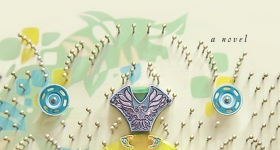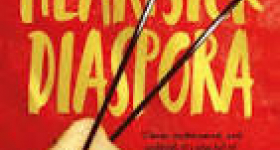Inside a single-use life, there are no second chances. That’s a lie but we live it. We live anyway. That’s a lie but the boy opens his eyes. The room a gray-blue smear. There’s music coming through the walls. Chopin, the only thing she listens to. The boy climbs out of bed and the corners of the room tilt on an axis, like a ship. But he knows this too is a trick he’s making of himself. In the hallway, where the spilled lamp reveals a black mess of broken vinyl 45s, he looks for her. In her room, the covers on the bed are pulled off, the pink lace comforter piled on the floor. The night-light, only halfway in its socket, flickers and flickers. The piano drips its little notes, like rain dreaming itself whole. He makes his way to the living room. The record player by the loveseat skips as it spins a record long driven to its end, the static intensifying as he approaches. But Chopin goes on, somewhere beyond reach. He follows it, head tilted for the source. And there, on the kitchen table, beside the gallon of milk on its side, the liquid coming down in white strings like a tablecloth in a nightmare, a red eye winking. The stereo she bought at Goodwill, the one that fits in her apron pocket as she works, the one she slides under her pillowcase during rainstorms, the Nocturnes growing louder after each thunderclap. It sits in the pool of milk, as if the music was composed for it alone. In the boy’s single-use body, anything’s possible. So he covers the eye with his finger, to make sure he’s still real, then he takes the radio. The music in his hands dripping milk, he opens the front door. It is summer. The strays beyond the railroad are barking, which means something, a rabbit or possum, has just slipped out of its life and into the world. The piano notes seep through the boy’s chest as he makes his way to the backyard. Because something in him knew she’d be there. That she was waiting. Because that’s what mothers do. They wait. They stand still until their children belong to someone else.
Because that’s what mothers do. They wait. They stand still until their children belong to someone else.
Sure enough, there she is, standing at the far end of the little chain-link yard, beside a flattened basketball, her back to him. Her shoulders are narrower than he remembers from hours ago, when she tucked him into bed, her eyes glazed and pink. Her nightgown, made from an oversized T-shirt, is torn in the back, exposing her shoulder blade, white as a halved apple. A cigarette floats to the left of her head. He walks up to her. He walks up to his mother with music in his arms, shaking. She’s hunched, distorted, tiny, as if crushed by the air alone.
“I hate you,” he says.
He studies her, to see what language can do — but she doesn’t flinch. Only halfway turns her head. The cigarette, its ember bead, rises to her lips, then flutters near her chin.
“I don’t want you to be my mom anymore.” His voice strangely deeper, more full.
“You hear me? You’re a monster —”
And with that her head is lopped off its shoulders.
No, she’s bending over, examining something between her feet. The cigarette hangs in the air. He reaches for it. The burn he expects doesn’t come. Instead, his hand crawls. Opening his palm, he discovers the firefly’s severed torso, the green blood darkening on his skin. He looks up — it’s just him and the radio standing beside a flat basketball in the middle of summer. The dogs now silent. And full.
“Ma,” he says to no one, his eyes filling, “I didn’t mean it.”
“Ma!” he calls out, taking a few clipped steps. He drops the radio, it falls mouth-down in the dirt, and turns toward the house. “Ma!” He runs back inside, his hand still wet with a single-use life, looking for her.
From On Earth We’re Briefly Gorgeous by Ocean Vuong. Reprinted by arrangement with Penguin Press, a member of Penguin Group (USA) LLC, A Penguin Random House Company. Copyright © Ocean Vuong, 2019.
For more information, please visit: https://www.penguinrandomhouse.com/books/600633/on-earth-were-briefly-go...










Comments